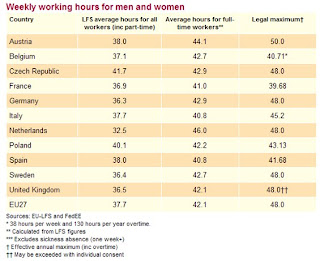According to an important report from the Federation of European Employees, almost all collective agreements set basic weekly working hours for full-time staff at between 35 hours and 40 hours a week, whilst in many countries such as Spain and Sweden there are statutory limits of 40 hours for normal weekly working time. White collar workers across Europe continue to work less hours than blue collar workers, although this gap is narrowing over time. Every EU country permits certain levels of overtime to be worked in addition to regular hours, but not all recognise the 48 hours per week maximum limit established by the EC Working Time Directive.
Data from the EU Labour Force Survey for Q4 2007 appears at first glance to confirm this general pattern, but closer investigation suggests that the reality may be quite different for many employees.
The report sostains that the governments of many EU member states have further enhanced these entitlements and created additional rights such as paternity leave, sabbaticals, sick leave arrangements and leave to care for dependants. Legally enforceable collective agreements have also gone beyond basic statutory rights to introduce even more opportunities to take time off work, and double holiday pay received by workers in some countries makes it more financially rewarding to be on annual leave than at work.
These changes, introduced for the benefit of employees, have had an effect quite contrary to that intended. Although additional time-off rights might be seen as an opportunity to generate extra jobs, the fragmented nature of absence due to such factors as sickness, emergency childcare or attendance at ante-natal clinics has meant that the cover required varies from day to day.
It also argues that, the split in social philosophies at the heart of Europe between libertarian 'American-style' values pursued by the UK, Ireland and many new EU states and the more welfare-orientated 'social model' maintained by many continental western European states such as France, Sweden and the Netherlands has recently come to a head over the issue of the UK's continued opt-out from the maximum working week.
The report finally conludes that the real problem about working time, however, is not the imposition of statutory upper limits, but a social framework that makes it impossible for companies to operate efficiently within these limits. Rather than preventing those who wish to work longer hours from improving their income levels, the focus for EU policymakers should be on increasing the proportion of the employed workforce that are available to carry out their jobs. This means taking a long hard look at how much employee benefits are creating a 'time off' culture and providing financial incentives to spend too much time absent from work.
Suscribirse a:
Enviar comentarios (Atom)



No hay comentarios:
Publicar un comentario